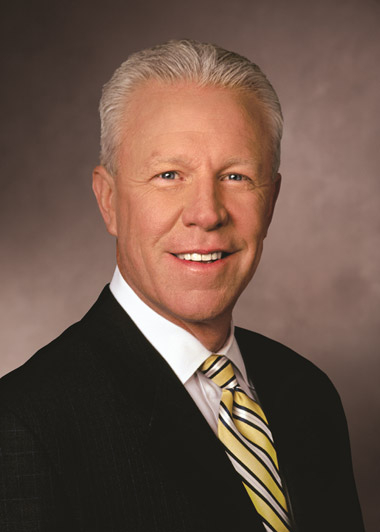John H. Weiland
Class of 2012
- Vice Chairman, President, and Chief Operating Officer (retired) C.R. Bard, Inc.

There is no limit to what a person can accomplish if they don't worry about who gets the credit.
John Weiland, the third of four children, was born in 1955 and grew up in a row house in downtown Philadelphia. "My father was a child of the Great Depression," says Weiland. "He lost his father when he was seven and a short time later he was diagnosed with tuberculosis. He recovered from that disease, but had a curvature of the spine that gave him a noticeable limp. He worked with his mother and brother in a small flower business for the rest of his life. The values he treasured the most were honesty and integrity. My father faced a lot of adversity in his life, but he always had a positive outlook."
Weiland's father needed expensive custom-made shoes to compensate for his limp. "Money was always tight in our house," says Weiland. "My father had his shoes stitched and re-stitched instead of buying new ones. For 12 years, they were his only pair of shoes." Much later, a family member had the shoes dipped in pewter and sent them to Weiland to display in his office so that he would never forget his past and the values he learned from his father.
Weiland's mother was a trained nurse and a loving woman who had high expectations for her children. She taught them to respect adults and demanded courteous behavior. "My mother was a spectacular woman," says Weiland. "She was devoted to the family. We didn't have much, but she made our home life so comfortable we never realized how little we had."
When Weiland was 10, his mother died suddenly from a cerebral aneurism. "She went into the hospital for a relatively routine procedure and passed away that night due to a complication from the procedure," he says. "My father returned from the hospital a broken man. For all of us, my mother's passing turned our lives upside down."
Weiland's father told his children they would have to grow up quickly. He needed their help with chores as well as expenses. The children split up the household responsibilities, including each night's dinner. "We took turns cooking, washing dishes, and cleaning the house," he recalls. "We all still laugh at my creativity in the kitchen. I was convinced that if you bake pork chops for 30 minutes at 300 degrees, then you might as well do it in half the time at 600. I learned to cook the hard way, through trial and error."
At the age of eight, Weiland began working in his father's greenhouses, earning 25 cents an hour. Eventually, he worked his way up to $1 an hour, convinced by his father that it was a good deal because no taxes were deducted from his pay. Weiland paid for his own school supplies and clothes, which made him a thrifty shopper. He usually bought his clothes at the Sears surplus store.
Being devout Catholics, the Weiland children attended Catholic schools. Weiland was a good student and enjoyed sports. When he was a little older, he added a paper route to his greenhouse duties. On Saturdays, he worked at the local supermarket, using his wagon to deliver groceries. "That's how I spent my childhood," he says. "I went to school, played sports, and worked like crazy at home and on the weekends."
In high school, Weiland's abilities in math and science were evident. He wanted to attend medical school, and the physician for his high school football team told him about Allentown College of St. Francis de Sales (later DeSales University) in Pennsylvania. Weiland won a partial scholarship to DeSales, a necessity for a teenager who at the time was earning only $1 an hour.
"College was spectacular," says Weiland. "It was a midsized school, and I really had a chance to be involved." He majored in biology and minored in marketing as a backup in case he did not get into medical school. But shortly after school started, Weiland learned that he owed $1,000 in tuition not covered by his scholarship. He made an appointment with the school's treasurer, Father Guerin, who made Weiland promise he would pay the debt before the end of his freshman year. From that point on, Guerin became a lifelong mentor who taught Weiland about the importance of setting and achieving goals.
Weiland worked overtime and paid the tuition on time. His jobs included working on dormitory maintenance, driving a school bus in the early morning hours before his classes started, and tending bar and caddying on weekends. While working those four jobs, he maintained his studies and played varsity soccer, baseball, and golf. Later, he was inducted into the DeSales University Sports Hall of Fame.
Shortly before his 1977 graduation, Guerin informed Weiland that he owed a $52 graduation fee. He had two days to pay; otherwise he could not attend his own graduation ceremony. That weekend, he caddied for two groups of businessmen who learned about his situation. They paid him caddie fees of $36 for the 36 holes and tipped him another $22 for a total of $58. Weiland paid his fee and contributed $6 to the senior party fund, thereby graduating without a dollar to his name. Later, in 1987, Weiland earned an MBA from New York University.
Weiland decided to focus on business instead of medicine as a career. After graduation, he joined American Hospital Supply Corporation, which had just merged with Baxter Travenol Laboratories, as a sales representative. "
